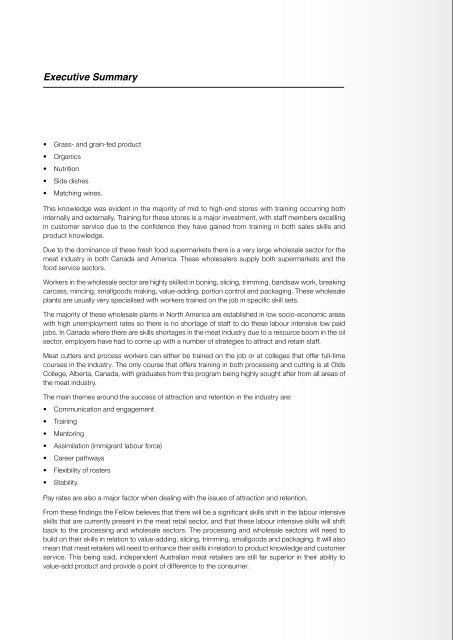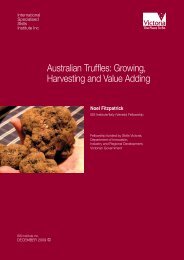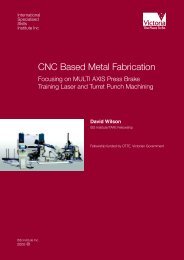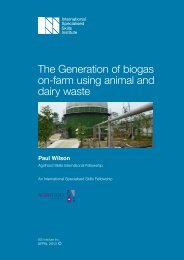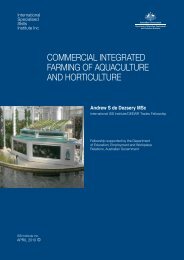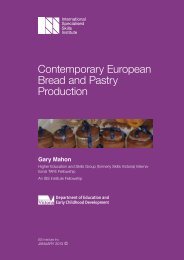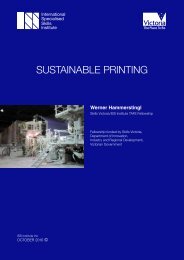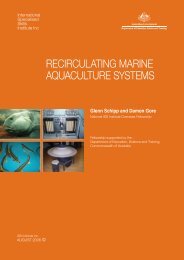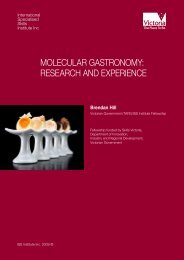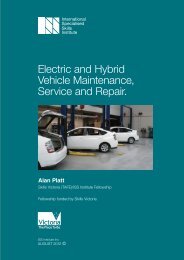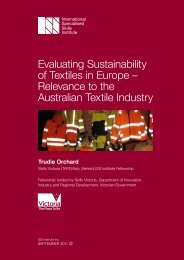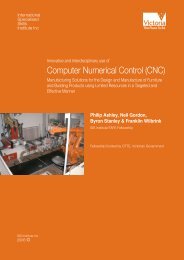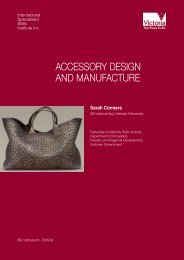Attraction and Retention Strategies for the Meat Retailing Industry
Attraction and Retention Strategies for the Meat Retailing Industry
Attraction and Retention Strategies for the Meat Retailing Industry
Create successful ePaper yourself
Turn your PDF publications into a flip-book with our unique Google optimized e-Paper software.
Executive SummaryTable of Contents• Grass- <strong>and</strong> grain-fed product• Organics• Nutrition• Side dishes• Matching wines.This knowledge was evident in <strong>the</strong> majority of mid to high-end stores with training occurring bothinternally <strong>and</strong> externally. Training <strong>for</strong> <strong>the</strong>se stores is a major investment, with staff members excellingin customer service due to <strong>the</strong> confidence <strong>the</strong>y have gained from training in both sales skills <strong>and</strong>product knowledge.Due to <strong>the</strong> dominance of <strong>the</strong>se fresh food supermarkets <strong>the</strong>re is a very large wholesale sector <strong>for</strong> <strong>the</strong>meat industry in both Canada <strong>and</strong> America. These wholesalers supply both supermarkets <strong>and</strong> <strong>the</strong>food service sectors.Workers in <strong>the</strong> wholesale sector are highly skilled in boning, slicing, trimming, b<strong>and</strong>saw work, breakingcarcass, mincing, smallgoods making, value-adding, portion control <strong>and</strong> packaging. These wholesaleplants are usually very specialised with workers trained on <strong>the</strong> job in specific skill sets.The majority of <strong>the</strong>se wholesale plants in North America are established in low socio-economic areaswith high unemployment rates so <strong>the</strong>re is no shortage of staff to do <strong>the</strong>se labour intensive low paidjobs. In Canada where <strong>the</strong>re are skills shortages in <strong>the</strong> meat industry due to a resource boom in <strong>the</strong> oilsector, employers have had to come up with a number of strategies to attract <strong>and</strong> retain staff.<strong>Meat</strong> cutters <strong>and</strong> process workers can ei<strong>the</strong>r be trained on <strong>the</strong> job or at colleges that offer full-timecourses in <strong>the</strong> industry. The only course that offers training in both processing <strong>and</strong> cutting is at OldsCollege, Alberta, Canada, with graduates from this program being highly sought after from all areas of<strong>the</strong> meat industry.The main <strong>the</strong>mes around <strong>the</strong> success of attraction <strong>and</strong> retention in <strong>the</strong> industry are:• Communication <strong>and</strong> engagement• Training• Mentoring• Assimilation (immigrant labour <strong>for</strong>ce)• Career pathways• Flexibility of rosters• Stability.Pay rates are also a major factor when dealing with <strong>the</strong> issues of attraction <strong>and</strong> retention.From <strong>the</strong>se findings <strong>the</strong> Fellow believes that <strong>the</strong>re will be a significant skills shift in <strong>the</strong> labour intensiveskills that are currently present in <strong>the</strong> meat retail sector, <strong>and</strong> that <strong>the</strong>se labour intensive skills will shiftback to <strong>the</strong> processing <strong>and</strong> wholesale sectors. The processing <strong>and</strong> wholesale sectors will need tobuild on <strong>the</strong>ir skills in relation to value-adding, slicing, trimming, smallgoods <strong>and</strong> packaging. It will alsomean that meat retailers will need to enhance <strong>the</strong>ir skills in relation to product knowledge <strong>and</strong> customerservice. This being said, independent Australian meat retailers are still far superior in <strong>the</strong>ir ability tovalue-add product <strong>and</strong> provide a point of difference to <strong>the</strong> consumer.i Abbreviations/Acronymsiii Definitions1 Acknowledgements1 Awarding Body – International Specialised Skills Institute (ISS Institute)2 Fellowship Sponsor2 Supporters2 Employer Support2 Organisations Impacted by <strong>the</strong> Fellowship3 About <strong>the</strong> Fellow5 Aims of <strong>the</strong> Fellowship Program7 The Australian Context7 SWOT Analysis8 SWOT Analysis11 Identifying <strong>the</strong> Skills Deficiencies13 The International Experience13 Visit 1: Olds College13 Visit 2: Nor<strong>the</strong>rn Alberta Institute of Technology (NAIT)14 Visit 3: University of Alberta – <strong>Meat</strong> Science Unit15 Visit 4: YB Quality <strong>Meat</strong>s16 Visit 5: Sunterra <strong>Meat</strong>s16 Visit 6: Costco17 Visit 7: Cargill17 Visit 8: Safeway Head Office18 Visit 9: Calgary Co-op18 Visit 10: Beef In<strong>for</strong>mation Centre (BIC)19 Visit 11: Choices Markets20 Visit 12: Walmart21 Visit 13: Superior Farms21 Visit 14: Pete’s Fresh Market Chain22 Visit 15: Fox & Obel23 Visit 16: Whole Foods Market23 Visit 17: Wegmans24 Visit 18: National Restaurant Association (NRA) Show 201124 Visit 19: Hunts Point25 Visit 20: Lobel’s of New York26 Visit 21: Citarella


